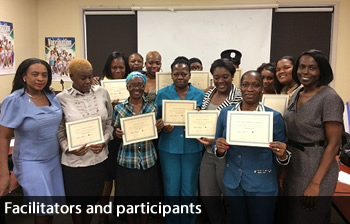3rd March 2016
 |
A team from the National Coordinating Committee (NCC) was invited to update the Cabinet on its plans for the national public education and sensitization campaign on the Caribbean Court of Justice (CCJ) that will be conducted over the next three months.
The team, led by Chairman of the NCC, Ambassador Dr. Clarence Henry, included secretary to the NCC, Barbara Williams, and Director of Communications, Everton Barnes.
The team outlined its plans for the official launch slated for March 10, the Youth Forum on March 11, the Business Breakfast on March 22 in collaboration with the Antigua Chamber of Commerce as well as a visit to Barbuda for engagements with various interest groups on the island. Dr. Henry also reported that there will be at least eight town-hall meetings at central locations across Antigua as part of the campaign. Additionally, the NCC will hold meetings with various stakeholder-groups such as the service clubs, the trade unions, teachers, the professional associations and students at the Antigua State College.
The team also outlined the media engagements that will accompany the public education campaign. There are plans to make regular appearances on all broadcast media in the country to inform the public about the CCJ and its role in Caribbean societies.
The Cabinet queried the NCC team about certain aspects of their plans and after being satisfied with the various explanations gave the committee the greenlight to proceed with their plans.
In his weekly update from the Cabinet, Chief of Staff, Lionel Max Hurst, reported that the campaign will run until the end of May with the possibility that a national referendum could be held any time from the month of June. "In the month following, or in June 2016, it is anticipated that the referendum will then be held. The Prime Minister and the Leader of the Opposition have both pledged their support for this referendum. In fact, the Prime Minister at the commencement of the process, sought assurances from the major opposition party that this exercise would be non-partisan or bi-partisan," Hurst stated.
According to Hurst the Prime Minister's view, which is shared the entire Cabinet, is that people ought to vote their conscience, not the political party. The Chief of Staff noted that in St. Vincent, it was a partisan issue and the referendum there was not successful. "A proposal was put forward to engage all the OECS states simultaneously. That has proven too big a challenge; hence, it will not proceed that way," Hurst added.
Dr Henry and team noted that following the meeting they feel further energized to conduct a comprehensive programme to educate and inform the people of Antigua and Barbuda and the CCJ.
